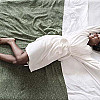Physical symptoms of depression: Can depression contribute to pain?

Adapted from Pain Relief Without Drugs or Surgery , Medical Editor: Melissa L. Colbert, MD, Instructor in Physical Medicine and Rehabilitation, Harvard Medical School; Interim Medical Director, Spaulding Rehabilitation Outpatient Center.
Given what we now know about the mind-body connections that can affect pain, it should come as no surprise that depression and anxiety can both contribute to and intensify pain. People with depression have three times the risk of developing chronic pain, and people with chronic pain have three times the usual risk of developing depression or anxiety.
Furthermore, daily stress can worsen all of these problems: it’s been well noted that both chronic pain conditions and mood disorders tend to flare up when people are under stress, whether that stress takes the form of illness in the family, relationship problems, career issues, or financial pressures.
Depression and physical pain
There is solid evidence to indicate that people with depression are more likely to suffer from migraine headaches, back pain, fibromyalgia, and other pain syndromes compared with nondepressed individuals. It can become a vicious cycle, with pain and depression egging each other on. Depression can lead to isolation, and isolation leads to further depression; pain can cause fear of movement, and immobility and muscle deconditioning can create the conditions for further pain.
Depression also makes pain more difficult to manage because people feel hopeless, making it hard to address the issues underlying pain. Psychotherapy and mind-body relaxation techniques can be helpful, possibly because they may help reset the brain’s and body’s communication systems.
It’s important to seek treatment for depression for many reasons — one of which is to break the cycle of pain.
Disclaimer:
As a service to our readers, Harvard Health Publishing provides access to our library of archived content. Please note the date of last review or update on all articles.
No content on this site, regardless of date, should ever be used as a substitute for direct medical advice from your doctor or other qualified clinician.















